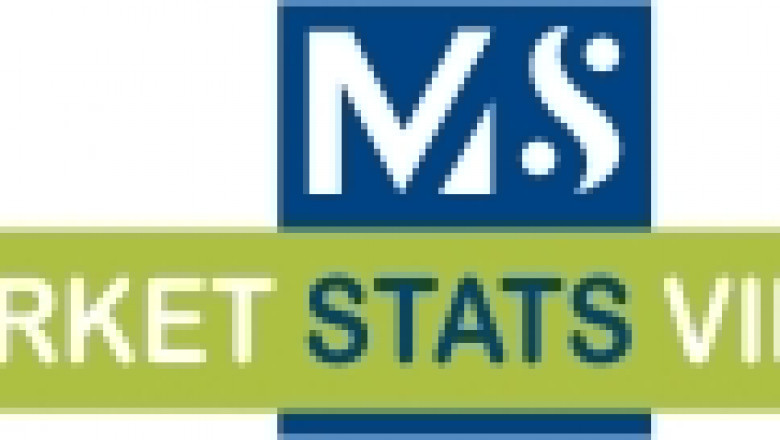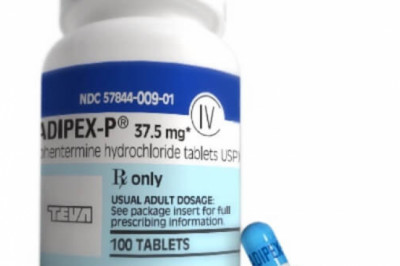views

Description
The global drug discovery market size was valued at USD 54,894.1 million in 2020 and is expected to reach USD 92,374.2 million by 2027, registering a CAGR of 8.49% during 2021-2027. Drug discovery process targets identifying a compound therapeutically useful in curing and treating diseases. Recently, drug discovery has evolved significantly with emerging technologies, helping the process become more refined, accurate, and less time-consuming.
The growing prevalence of chronic diseases and the rising healthcare expenditure, and the upcoming patent expiration of blockbuster drugs are the major factors driving the drug discovery market's growth over the coming years.
Also, as per the National Health Interview Survey (NHIS), 2018 data, nearly 51.8% of the American adults had at least one of ten selected diagnosed chronic diseases, which included arthritis, cancer, chronic obstructive pulmonary disease, coronary heart disease, asthma, diabetes, hepatitis, hypertension, stroke, and kidney disorders. Also, 27.2% of adults had multiple chronic conditions in the United States in 2018. Thus, the rising chronic diseases incidence is expected to surge the novel therapeutics demand, which is predicted to boost the drug discovery market growth during the forecast period.
However, the huge capital investment with low-profit margins and stringent government regulations are expected to restrain the market growth over the forecast period.
Get a Sample PDF copy of the Report: - https://www.marketstatsville.com/request-sample/drug-discovery-market
Global Drug Discovery Market Dynamics
Drivers: Rising prevalence of various chronic diseases
- The increasing incidence of chronic diseases such as cardiovascular disease, diabetes, cancers, gastrointestinal tract infections, and other diseases is the major factor for the drug discovery market's growth.
- According to the research article published in Preventing Chronic Disease, 2020, the prevalence of chronic diseases in adults of the United States accounted for 27.2% in 2018. In contrast, it was 25.5% in 2012, 26.0% in 2010, and 21.8% in 2001.
- According to Globocan 2020, the new cancer cases that were diagnosed accounted for 19,292,789 in 2020 globally, with 9,958,133 deaths due to cancers globally. Among all cancers, breast cancer accounted to 2,261, 419 new cancer cases, followed by lung (2,206,771), Prostate (1,414,259) and colon (1,148,515) new cases in 2020.
- Additionally, as per the International Diabetes Federation Diabetes Altas Ninth Edition 2019, nearly 463 million globally live with diabetes worldwide and is expected to reach 700 million by 2045. The total health expenditure caused by diabetes was estimated to be USD 760 million in 2019 globally. The increasing incidence of diabetes and cancers raises the demand for targeted therapeutics to manage the diseases effectively. This aspect is expected to boost the growth of the studied market over the forecast period.
- Corresponding to the Centers for Disease Control and Prevention (CDC), National Center for Health Statistics 2018, approximately 14.8 million adults were detected with ulcers. Nearly 22.4 million visits to physician offices were made with the digestive system's diseases as a primary diagnosis.
- Also, as per the Chronic Kidney Disease (CKD) Surveillance System, the prevalence of CKD was estimated to be 14.4% in 2020 and is expected to reach 16.7% by 2030.
- Hence, due to the surge in disease and awareness among patients for personalized treatment, there is a high need for newer, safe, and effective molecules, leading to drug discoveries.
Restraints: Huge capital investment with low-profit margins
The cost for developing a drug depends on multiple factors, which ultimately results in a high monetary burden on the companies involved in drug discovery and development. According to a research article published in JAMA in 2020, the estimated median capitalized research and development cost per drug development was USD 985 million in 2018, including the expenditures on failed trials and the mean cost of developing a new drug had been estimated to range from USD 314 million to USD 2.8 billion.
Some of the major factors for high cost include the cost of drug candidates' failures in trial stages. A high percentage of drugs tested on patients do not reach the market, unsafe or ineffective. Apart from that, the return on investment (ROI) is declining significantly, which keeps the pharmaceutical companies under pressure to increase their success rate in limited resources to reduce the cost of failure.
Thus, the high capital investment into drug development with low-profit margins remains a major barrier in the drug discovery market.
Opportunities: Increasing research and development investments for the development of novel drug molecules
The research and development (R&D) expenditure by pharmaceutical companies has increased in the past few years. For instance, Pfizer spent USD 8,650 million in 2019, compared to USD 7,690 million on R&D in 2015. It directly translates to increased expenditure on drug discovery. As per a 2020 report by Olivier J. Wouters et al., published in the American Medical Association (JAMA) Journal, the estimated median capitalized research and development cost per product between 2009 and 2018 was USD 985 million, which also included expenditure on failed trials. As per the research article published in BioPharma Trend 2020, the rapid progress in artificial intelligence in the pharmaceutical industry for drug discovery is witnessed. This aspect is expected to boost the high investment in R&D activities of discovering new drug targets. Additionally, biotech investors are increasingly optimistic about the use of artificial intelligence in the field of drug discovery. They thus have been pouring heavy money into AI-based drug discovery approaches.
For instance, in 2019, Xtalpi, an American Chinese-based biotech company, raised USD 319 million in funding to advance its Intelligent Digital Drug Discovery and Development (ID4) platform, which predicts small molecules candidates properties, solid-form selection, and other services.
These research advances have resulted in many breakthrough innovations of highly effective drugs against various chronic diseases, which has led most investors to invest in drug discovery research and development. It has helped the market growth.
Scope of the Report
The study categorizes the drug discovery market based on drug type, technology, and end user.
By Drug Type
- Small Molecule Drugs
- Biologic Drugs
By Technology
- High Throughput Screening
- Pharmacogenomics
- Combinatorial Chemistry
- Nanotechnology
- Other Technologies
By End User
- Pharmaceutical Companies
- Contract Research Organizations (CROs)
- Other End Users
By Region
- North America (US, Canada, Mexico)
- South America (Brazil, Argentina, Colombia, Peru, Rest of Latin America)
- Europe (Germany, Italy, France, UK, Spain, Poland, Russia, Slovenia, Slovakia, Hungary, Czech Republic, Belgium, the Netherlands, Norway, Sweden, Denmark, Rest of Europe)
- Asia Pacific (China, Japan, India, South Korea, Indonesia, Malaysia, Thailand, Vietnam, Myanmar, Cambodia, the Philippines, Singapore, Australia & New Zealand, Rest of Asia Pacific)
- The Middle East & Africa (Saudi Arabia, UAE, South Africa, Northern Africa, Rest of MEA)
Buy an exclusive copy: - https://www.marketstatsville.com/buy-now/drug-discovery-market?opt=2950
The small molecule drugs segment of the drug discovery market is projected to account for the largest share by mode of operation
Based on the drug type, the drug discovery market has been segmented into small-molecule drugs and biologic drugs. In 2020, the small molecule drugs segment accounted for the largest share of 74%, with a market size of USD 40,672.4 million in the global drug discovery market. Small molecule drugs are thus found to play an important role in fighting diseases. Small molecules continue to maintain increasing applications in drug discovery and the development of biopharmaceutical companies. The small molecule drug discovery market is thus expected to witness huge growth owing to increasing small molecule drugs approval, rising demand for R&D from contract organizations, and rising adoption of small molecules in chronic disease treatments. In addition, the emergence of the COVID-19 pandemic is further accelerating this trend. Hence, the small-molecule drugs are heavily involved in developing therapies designated by the US Food and Drug Administration (FDA) as breakthrough therapies. All these factors have thus helped in driving the market growth.
Asia Pacific accounts for the highest CAGR during the forecast period in the drug discovery market.
Based on the regions, the global drug discovery market has been segmented across North America, Asia-Pacific, Europe, South America, and the Middle East & Africa. In 2020, North America accounted for the largest market share of 42.6%, which equals USD 23,378.72 million in 2020 and is further estimated to grow at a CAGR of 7.74% during the forecast period. Moreover, Asia Pacific is expected to grow at the highest CAGR of 10.25% from 2021 to 2027. The rising burden of cancer in China is also expected to drive the market. According to the Globocan 2020 data, there were 4.57 million cancer cases in 2020, and the number is projected to reach 5.81 million by the year 2030. Also, China has the highest number of people with diabetes, and nearly one in three adult diabetic patients is from China. According to the International Diabetes Federation (IDF), the prevalence of diabetes in adults in China in 2020 has been recorded at 10.9%, about 116,446,900 diabetes cases. The number of diabetes cases in China is expected to increase in the future, thus increasing the demand for pharmaceuticals. Therefore, the above-mentioned factors help the market to grow in the forecast period.
Impact of COVID-19 on the Drug Discovery Market
Most biotechnological and pharmaceutical companies are focusing their R&D departments on identifying new molecules or leads for the coronavirus disease treatments, which is in the final phase of clinical trials. Many countries, such as the UK and USA, have already approved Comirnaty (BNT162b2), an mRNA-based vaccine developed by Pfizer–BioNTech on December 3, 2020.
Healthcare facilities such as diagnostic centers and hospitals have invested heavily in maintaining essential equipment and drugs. The medical equipment and pharmaceutical companies are also focusing on their R&D and manufacturing facilities to develop and manufacture essential medical devices and drugs.
Amid the COVID-19 pandemic, countries' health systems are rapidly investing in research and development to combat the virus. Potential compounds were screened from the CHEMBL database, ZINC database, FDA-approved drugs, and molecules under clinical trials.
Request for Report TOC, Table of Figure, Chart, etc:- https://www.marketstatsville.com/table-of-content/drug-discovery-market
Key Market Players
The major players of the studied market are Pfizer Inc., GlaxoSmithKline PLC, Merck & Co. Inc., Agilent Technologies Inc., and Eli Lilly and Company. These players have been adopting various winning strategies to gain higher shares or retain leading positions in the market. The key market players considering in the report scope are –
- Pfizer Inc.
- GlaxoSmithKline PLC
- Merck & Co. Inc.
- Agilent Technologies Inc.
- Eli Lilly and Company
- F. Hoffmann-La Roche Ltd
- Bayer AG
- Abbott Laboratories Inc.
- Thermo Fisher Scientific Inc.
- Shimadzu Corp
Additionally, the key players' increasing research and development activities to launch innovative drugs with advanced features and strategic alliances are expected to drive the market growth. For instance, on March 31, 2020, Existencia, an AI-based drug discovery company, entered a collaborative agreement with Diamond Light Source and Scripps Research for identifying COVID-19 antiviral therapies. It is anticipated to contribute to the growth of the market over the forecast period.
Recent Developments
- In August 2020, Shimadzu Corporation and HORIBA Ltd an agreement to commence the collaboration on the development and sales of LC-Raman analytical and measuring instruments that combine Shimadzu’s high-performance liquid chromatographs (HPLCs, hereinafter LCs) with HORIBA’s Raman spectrometers.
- In January 2021, Thermo Fisher Scientific Inc. announced that it would be acquiring Mesa Biotech Inc., a privately held molecular diagnostic company. The deal was valued at approximately USD 450 million in cash.
- In June 2020, Abbott and Tandem Diabetes Care signed a partnership agreement to develop and commercialize integrated diabetes solutions.
- In October 2020, Bayer AG acquired Asklepios Biopharmaceutical Inc., a US-headquartered biopharmaceutical company specializing in researching, developing, and manufacturing gene therapies across different therapeutic areas.
Key Issues Addressed
- What is the market size by various segmentation of the drug discovery by region and its respective countries?
- What are the customer buying behavior, key takeaways, and Porter's 5 forces of the drug discovery market?
- What are the key opportunities and trends for manufacturers involved in the drug discovery supply chain?
- What are the fundamental dynamics (drivers, restraints, opportunities, and challenges) of the market?
- What and how regulations, schemes, patents, and policies are impacting the growth of the market?
- What are the upcoming technological solutions influencing market trends? How will existing companies adapt to the new change in technology?
- The market player positioning, top winning strategies by years, company product developments, and launches will be?
- How has COVID-19 impacted the demand and sales of Drug Discovery in the global market? Also, the expected BPS drop or rise count of the market and market predicted recovery period.
- Detailed analysis of the competitors and their latest launch, and what are the prominent startups introduced in the target market? Also, detailed company profiling of 25+ leading and prominent companies in the market.
Request For Report Analysis: - https://www.marketstatsville.com/drug-discovery-market












